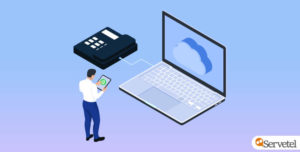Customer surveys help businesses collect crucial real-time feedback from their target audience. Regular feedback collection lets businesses make important changes to products and services and align them with buyer expectations.
This results in a seamless customer experience and a strong competitive edge.
According to American Express, customers are usually willing to spend as much as 17% more on a brand that offers good customer service!
Why automate customer surveys?
The traditional methods of surveying customers come with their own shortfalls.
Calls and messages can demand more time from customers than they wish to offer. They may also be wary of sharing their personal details over the phone.
Thus, to combat these hurdles, technologies today offer several automated solutions to facilitate easy feedback collection.
Using cloud telephony for customer surveys
Apart from offering cheaper options, cloud technology allows for a simpler, faster and more reliable way to collect, store and manage data from customer surveys.
The core advantage of cloud telephony solutions is that they help businesses automate mundane, recurrent processes that demand human assistance.
This includes the collection of surveys from large groups of people.
Instead of contacting each consumer after every transaction, companies can automate surveys to record how buyers feel about their experience. Features like voice broadcasting can also be used by businesses to initiate contact with buyers.
This not only helps employees manage their time and workload but also shows buyers that their time and privacy are respected.
Some primary uses of cloud telephony solutions in automated customer surveys are:
1. IVR-integrated toll free numbers
An IVR-integrated toll free number lets survey respondents record their feedback via automated calls.
The IVR and toll free numbers can be used together to reach a wide audience with pre-recorded calls. Customers can then input feedback using their mobile’s numeric keypad.
Automated surveys help reduce the manual effort of contacting each respondent personally. This eliminates the need for checking time zones or the caller’s availability. The chances of misdials also reduce.
Moreover, when the customer misses a call, they can always be contacted at a later time.
When a company has its own toll free number that can be accessed 24×7, it also establishes more trust and confidence in its customers. And with the customer calls being free of charge, they are less hesitant to reach out to the business for any assistance or query.
In case the caller requests human intervention and has to be placed on hold, this wait-time can be utilised to inform them of other features or about upcoming deals and offers.
Businesses can utilise music-on-hold to soothe the waiting callers.
2. Voice broadcasting
Voice broadcasting is a feature that comes in handy for businesses to maintain consistent contact with their customer base.
Outbound calling with voice broadcasting can help your brand reach all its customers at the same time, with the same message.
Businesses can use voice broadcasting to ensure there are regular follow-ups with customers to ensure satisfaction and build loyalty.
With voice broadcasting, you can record all your information beforehand, leaving no room for errors. By deciding the appropriate tone and semantics, the chances of miscommunication reduce significantly.
Businesses can even alter the message in different languages to cater to their customer base.
3. Text-based customer surveys
Automation of customer surveys also allows businesses to pick a medium of their choice. While IVR-based surveys can be conducted via call, businesses can also use SMSes to collect feedback remotely.
SMS surveys are text messages that can be sent to customers on their mobile devices. They usually contain a link to a feedback form where the customers can enter their information, along with their opinions and suggestions.
Instead of a link, an entire survey can also be sent via SMS using feedback message templates. For these, the respondent can answer by simply pressing certain digits on their keypad.
So, for instance, you can send a message to your customers which says: “Press 1 if you’re satisfied with our services or 2 if you would like to speak to an agent.”
The key benefit of SMS-based surveys is that customers can take them at their own discretion. These messages can also be scheduled to reach customers according to their respective time zones.
Additionally, both call and message-based surveys don’t have to be restricted to customers. A company can also regularly survey its employees to understand and address loopholes in its work culture and overall operations.
4. Integration of real-time analytics to measure performance
Cloud solutions let companies track and understand respondents’ data in real-time. Feedback and concerns, as they arrive in the system, are studied through various in-built analytics.
One of the biggest perks of cloud-based analytics is that they can help your business track multiple campaigns, even if they are running simultaneously.
This leads to a timely understanding of performance and identification of bottlenecks to prompt corrective measures.
Multiple surveys can be sent out using cloud-based phone numbers. This is done by linking different extensions to different surveys. Crucial customer insights can be used to improve products and services to best fit buyer expectations.
These insights can also be leveraged to promote upcoming marketing campaigns or to offer special services to loyal customers via outbound calling. The data collected is stored securely and also easily access to employees.
Real-time analytics can also provide data such as the duration of each call, the overall sentiment during a survey call and how each caller responds during their interaction with your business.
This data can be used to focus on important pain points that the respondent may be hesitant to explicitly mention during a one-on-one interaction.
5. Using CRM tools to better understand customer surveys
Feedback from particular consumers can be tracked and analysed in greater detail by pairing your company’s existing CRM system with cloud technology.
With information on purchase history and data from surveys, customer responses can be studied to customise products as per their demands
According to Microsoft, 56% of people around the world have stopped doing business with a company because of a poor customer service experience.
Thus, while dealing with negative feedback, respondents can be contacted directly to help them express their views better. The company can then resolve these issues in ways that are mutually beneficial and promising.
Going the extra mile, companies can follow up with their consumers and in special cases, offer additional compensation such as discounts or free services.
This not only promotes better relationships, but also positions your brand as one that takes action after errors.
Additionally, with the ability to store customer data in CRMs, agents need not start afresh with returning customers. Since all their past interactions are stored, they can just pick up right from where they left off.
Stored data can also be used to reach potential buyers through outbound calls. Here, agents can pitch upcoming marketing campaigns and other offers in hopes for conversions.
Conclusion
The importance of customer surveys cannot be underestimated. Not only do they offer you valuable insights into the minds of the customers, but also provide you with headway into improving your products and services.
Thus, it is important that such a crucial activity be carried out with the appropriate tools.
The power of cloud communications can help you collect and analyse customer survey responses more effectively. With tools like IVR and voice broadcasting, you are able to always connect with your customers, without invading their privacy.
To know more, contact us at 1800-120-4132

















